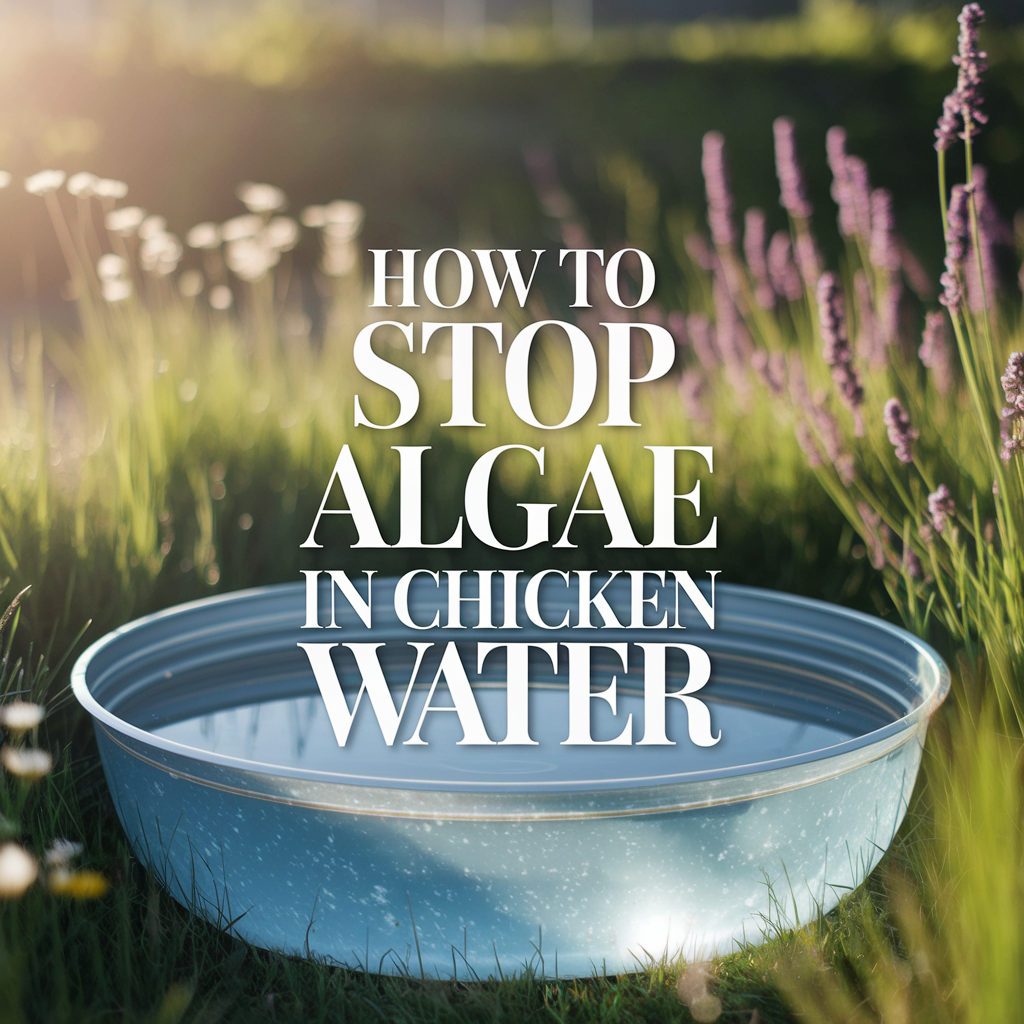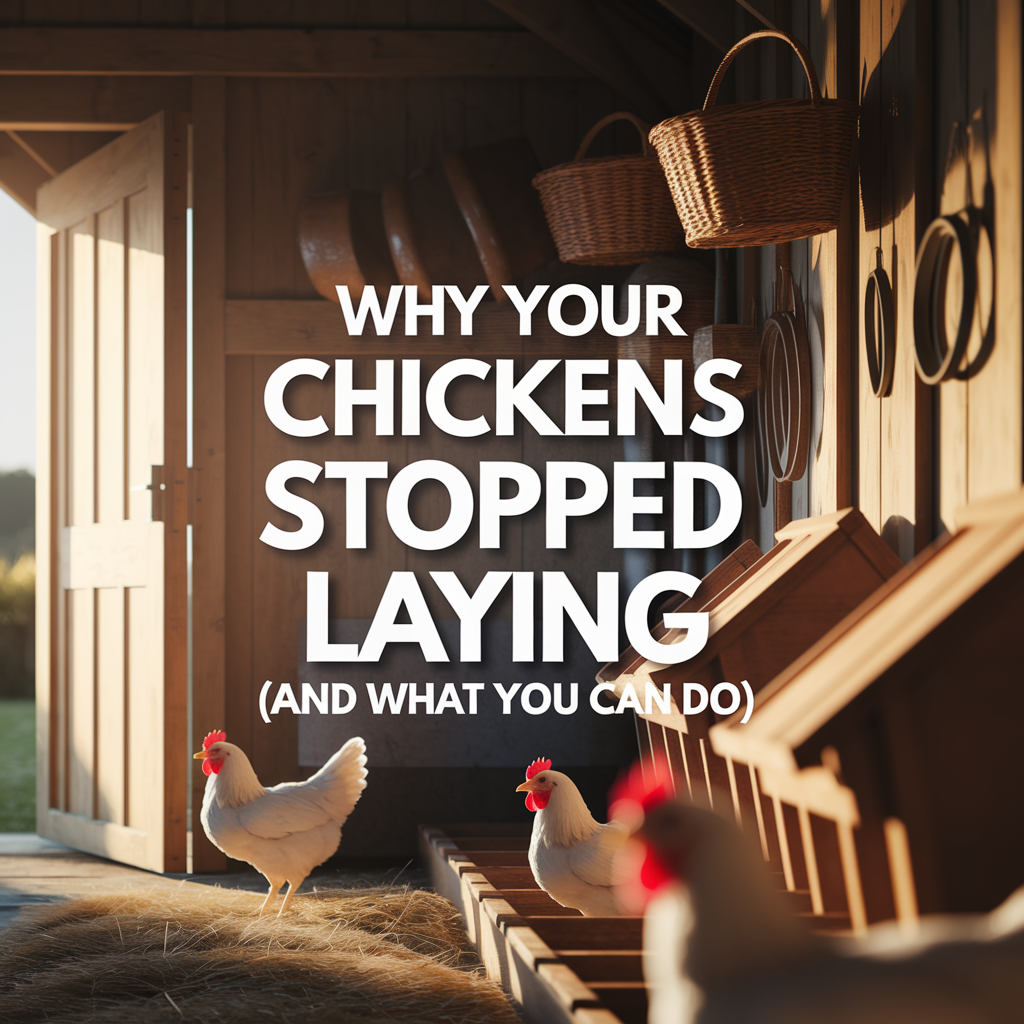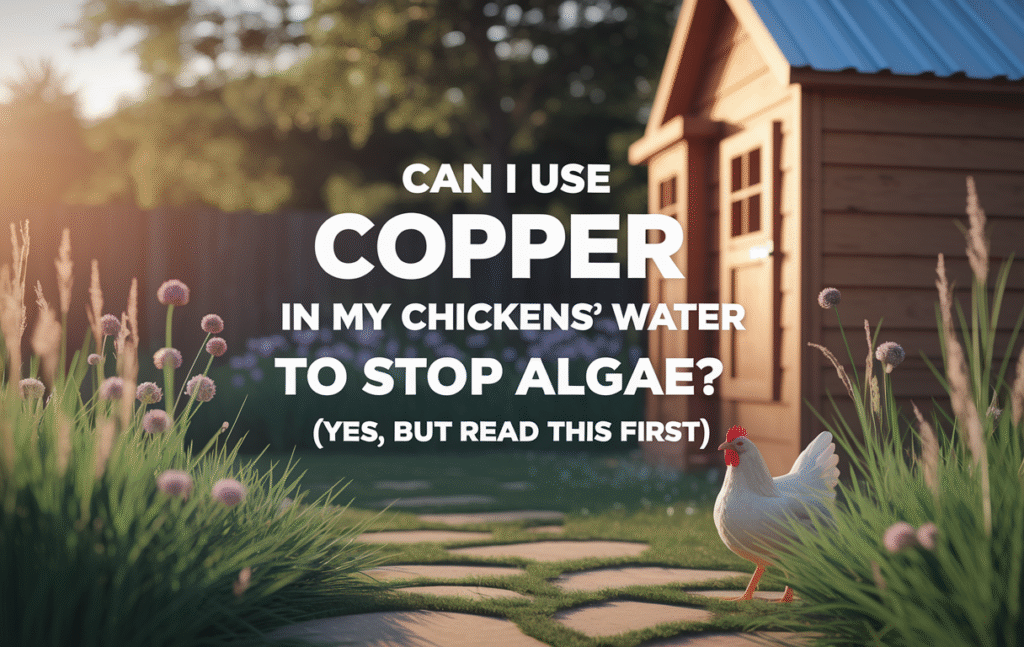
Can I Put Copper in My Chicken Water to Stop Algae?
If you’ve ever peeked into your chicken waterer mid-summer and saw more green slime than actual water… welcome to the club. One trick that works surprisingly well is dropping copper into your chicken water to stop algae from growing. And no — it won’t hurt your chickens if you do it right.
I’ve used copper in chicken water for algae on and off for years. When I finally got tired of scrubbing green gunk out of my drinkers every week, I decided to try adding a small piece of copper pipe — and I haven’t looked back. The water stays cleaner, my hens stay hydrated, and I don’t have to fight the slime monster every time I refill the bucket.
But before you go digging through your spare change looking for old pennies, let’s talk about what type of copper is actually safe — and what to avoid.

Why Does Algae Grow in Chicken Water So Fast?
Algae is sneaky. Give it sunlight, warmth, and still water, and it shows up like an uninvited guest at a barbecue. Most backyard waterers are clear plastic or sit in direct sun, which turns them into a little greenhouse for algae growth.
It doesn’t take long — sometimes just a couple of warm days before you start seeing that green film cling to the sides. That stuff might not seem like a big deal, but it makes the water taste off, can clog up nipple-style drinkers, and worst of all, makes chickens drink less when they need it most.
That’s why people (like me) start asking can chickens drink water with copper and is it safe to add something to the water to stop the slime before it even starts. Spoiler alert: it is — but only if you use the right kind of copper, and not the kind your chickens might try to eat.
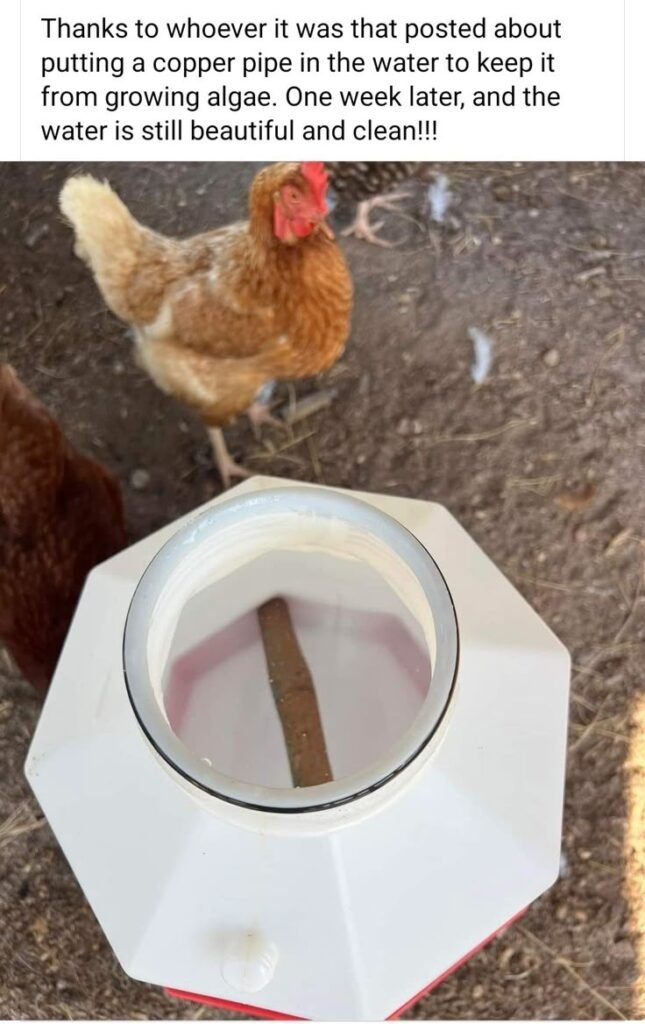
Why Copper Works to Stop Algae in Chicken Water
So how does copper in chicken water for algae actually help? It’s not some internet myth — it’s basic science that works in the real world too.
Copper is naturally antimicrobial, which means it messes with the way algae (and even some bacteria) try to grow. It releases trace amounts of copper ions into the water — not enough to harm your birds, but just enough to throw a wrench in the algae’s plan to take over your waterer.
When I started using a small copper pipe in my bucket-style drinker, the difference was quick and obvious. Instead of green sludge showing up by day three, I could go a full week or more without seeing any signs of algae.
And yes — I still clean my waterers regularly, but I’m no longer scrubbing them like I’m prepping them for surgery every two days. It’s just a smart, passive way to keep algae at bay, especially in summer.

What Type of Copper is Safe for Chickens?
This part’s important: not all copper is safe to use, and definitely not in any form that your chickens can swallow or peck at.
Here’s what I personally use and recommend:
- A solid piece of copper pipe (like you’d find at any hardware store)
- A short length of pure copper wire twisted into a tight coil
- A small copper elbow fitting — if it’s heavy enough to stay at the bottom of your water container
Keep in mind, you want solid, uncoated copper — no paint, no zinc coating, no decorative junk. Just pure copper that sits at the bottom of the waterer, out of sight and out of pecking range.
A lot of people ask is copper safe for chickens — and it absolutely is, as long as they aren’t eating it. You’re using it to clean the water, not feed the birds. And that brings me to the shiny mistake I see far too often: pennies.
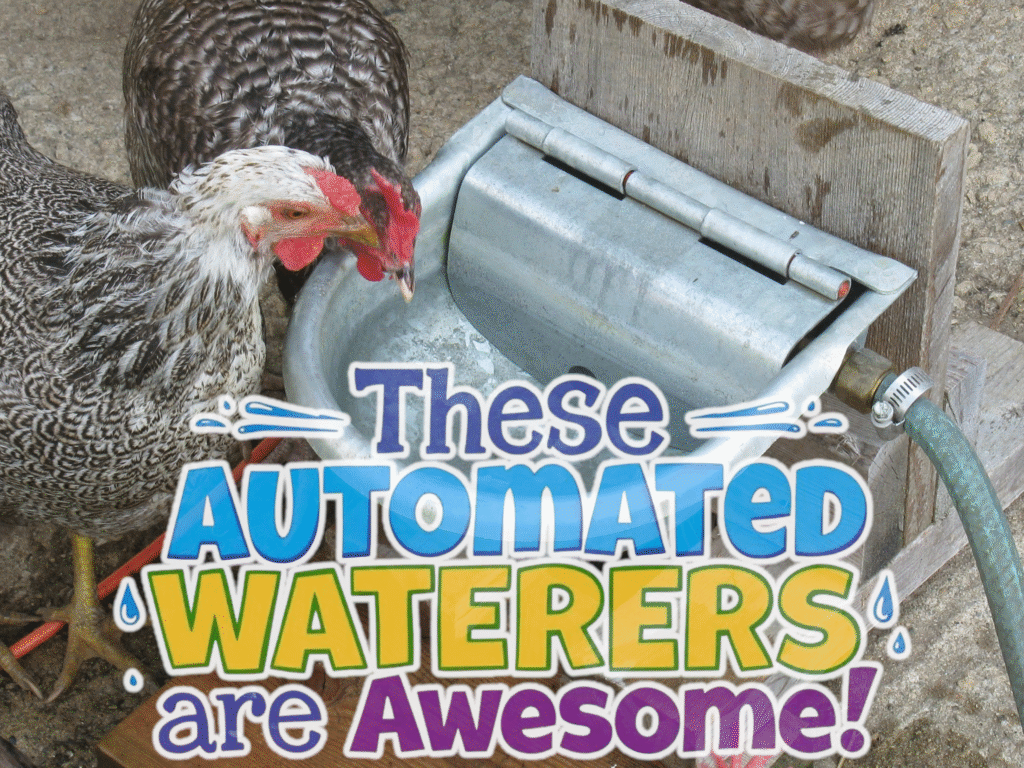
Can I Use Pennies in My Chicken Water?
Short answer? Nope. And here’s why.
While it’s true that old pennies (pre-1982) were made mostly of copper, the risks far outweigh the benefits. Chickens are curious little creatures. If they see something shiny at the bottom of their waterer, they’ll try to peck it. And if they manage to swallow it? You’ve got a whole different problem on your hands.
Not only that, but modern pennies aren’t even real copper anymore — they’re mostly zinc with a thin copper coating. And zinc can be dangerous if it leaches into the water or gets ingested.
So if you’re serious about using copper in chicken water for algae, skip the coins and go straight for a safer option — solid copper plumbing pieces that won’t look like a snack.
How to Safely Use Copper in Your Chicken Water System
Adding copper to your setup is easier than you think. Here’s how I do it on my homestead:
- Get a 3–6 inch piece of solid copper pipe from the plumbing section of any hardware store.
- Drop it into the base of your waterer — bucket-style, gravity-fed, or even nipple systems.
- Make sure it stays in place and out of view — you don’t want it floating around or drawing attention from the hens.
- Replace it every few months if it gets corroded or beat up. Copper lasts a while, but not forever.
It’s a simple setup that takes less than five minutes but helps cut down on cleaning time and gross algae buildup. I’ve used a basic copper water pipe for chicken water for two summers now, and it’s made my daily chicken chores a whole lot easier.
Other Ways to Keep Algae Out of Chicken Water
Copper helps, no doubt about that — but it works best when paired with some other common-sense practices. Here’s what I’ve found keeps the slime away and the water fresher, longer:
- Keep waterers out of direct sunlight. Even partial shade helps slow algae growth.
- Use dark-colored or covered waterers. Algae needs light to grow — so block it out.
- Clean with white vinegar once a week. It’s safe, effective, and doesn’t leave behind residue.
- Rotate waterers. Let one dry completely while using another. Algae hates dry surfaces.
- Don’t use clear plastic containers — they act like mini greenhouses in the sun.
Also, if your chickens are at laying age and you’re still waiting for that first egg, make sure water quality isn’t one of the issues slowing them down. I wrote a full guide that explains exactly when chickens start laying eggs and what to look for so you’re not left guessing.
Good, clean water keeps your hens healthy and productive — and algae doesn’t deserve a spot at their water dish.
Will Copper Hurt My Chickens If Used Long-Term?
This question comes up a lot, and it’s one I had myself the first time I dropped a piece of copper into my drinker: Will copper build up in the water and hurt my flock over time?
I’ve done the research and lived the results — and the answer is no. When you’re using a small, solid piece of copper(like a pipe or fitting), it releases only trace amounts of copper ions into the water. These levels aren’t high enough to affect your birds in a negative way, especially if you’re keeping their water fresh and rotated regularly.
I wouldn’t go overboard and toss in a handful of copper fittings or fill a trough with wire, but one small, clean piece is safe. And it makes a big difference in water quality without relying on chemicals or treatments.
So yes, your chickens can safely drink water with copper in it — just do it smart, keep it simple, and stick to the solid stuff.
Did you know? Using An Automatic Waterer can help keep water clean as new water is automatically added as water is used!
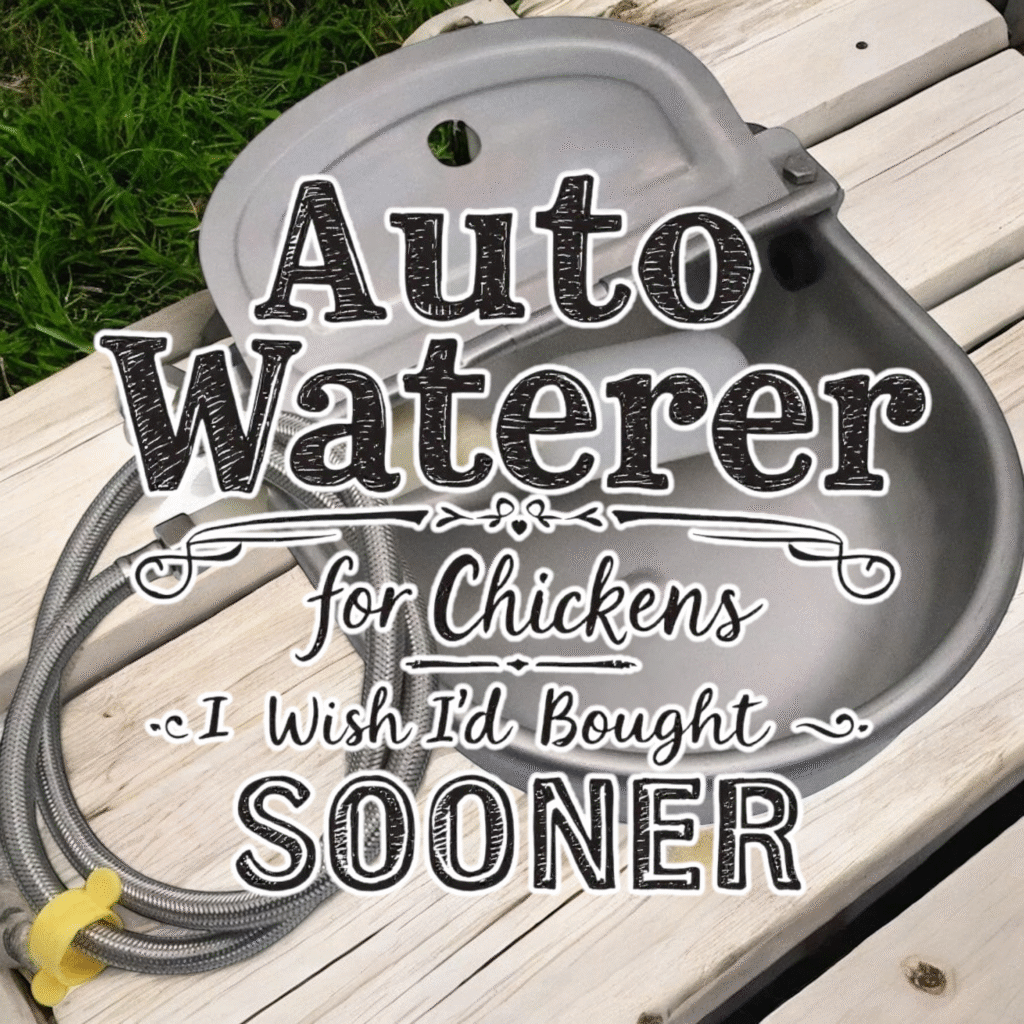
Our Final Thoughts on Using Copper in Chicken Water for Algae Control
If you’re tired of green slime taking over your drinkers every week, adding copper in chicken water for algae really is one of the simplest tricks in the book. I’ve used it for years now, and it’s helped me cut way down on cleaning while giving my flock cleaner, fresher water.
Just remember: skip the pennies, stick with solid copper pipe or fittings, and don’t overcomplicate it. It’s a small change that goes a long way.
Clean water means healthier birds, better egg production, and fewer headaches for you. If you’re just getting started with chickens, don’t forget to check out this helpful guide on when hens start laying — clean water is just one piece of the puzzle.
Copper is safe, effective, and one of those little backyard hacks that actually works. Trust me — your flock (and your scrub brush) will thank you.
As an Amazon Associate we earn from qualifying purchases through some links in our articles.

